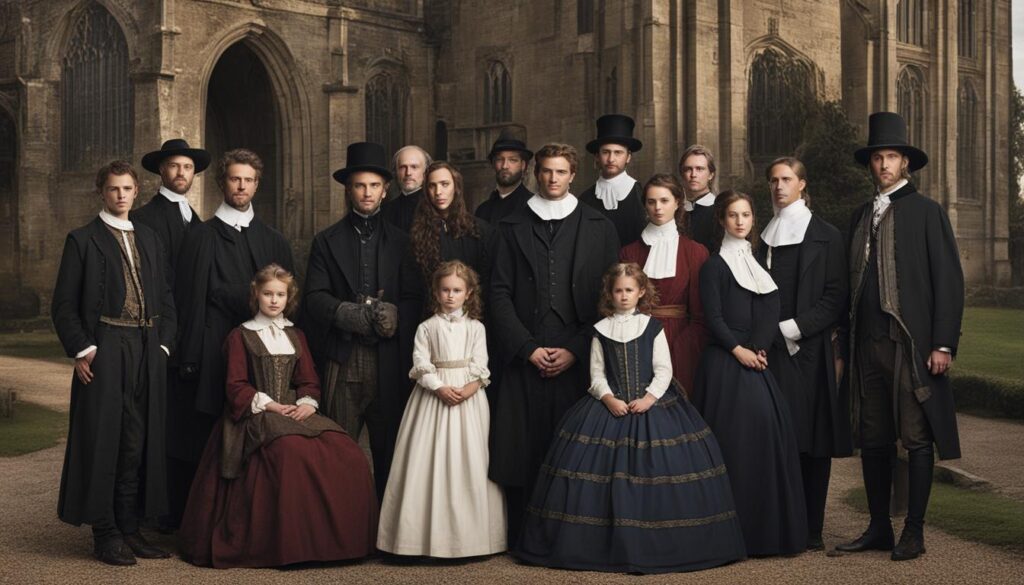The terms “Protestants” and “Puritans” are often used interchangeably, but they actually refer to two distinct groups with different beliefs and histories. Protestants were a broader religious movement that emerged during the English Reformation, while Puritans were a specific group within Protestantism. Understanding the differences between these two groups is essential to grasp the nuances of religious history.
Key Takeaways:
- Protestants and Puritans are not the same thing, despite often being confused.
- Protestants emerged during the English Reformation, while Puritans were a specific group within Protestantism.
- Protestants have a broader belief system, while Puritans had stricter beliefs and practices.
- Protestants have a more diverse church structure, while Puritans favored a congregational church structure.
- Both groups have left a lasting impact on American history and culture.
The Origins of Protestants and Puritans
The Protestant movement and the Puritan movement have distinct origins and histories within Christianity. Understanding their beginnings is crucial to comprehending the differences between these two groups.
The Protestant movement emerged during the English Reformation in the 16th century. It aimed to reform the Church of England, which had become corrupt and oppressive. Many Protestants believed that the church needed to be purified by eliminating practices they considered to be non-biblical, such as the veneration of saints and the use of icons. They sought to return to a simpler, more authentic form of Christianity based on the teachings of the Bible. However, not all Protestants agreed on the extent of reform needed.
Within the Protestant movement, a group known as the Puritans emerged. They believed that the reforms undertaken by the Church of England were insufficient, and they sought a more thorough purification of the church. The Puritans believed in a strict interpretation of the Bible and emphasized personal piety and moral behavior. They aimed to create a church that reflected their ideals and separated themselves from the existing Anglican Church.
The Puritans eventually formed separate churches and sought religious freedom in Holland. In contrast, the majority of Protestants chose to remain within the Church of England and work towards reform from within.
- The Protestant movement originated during the English Reformation
- Puritans were a specific group within Protestantism
- Protestants aimed to reform the Church of England
- Puritans sought a more thorough purification of the church
- The majority of Protestants remained within the Church of England
Beliefs and Practices of Protestants
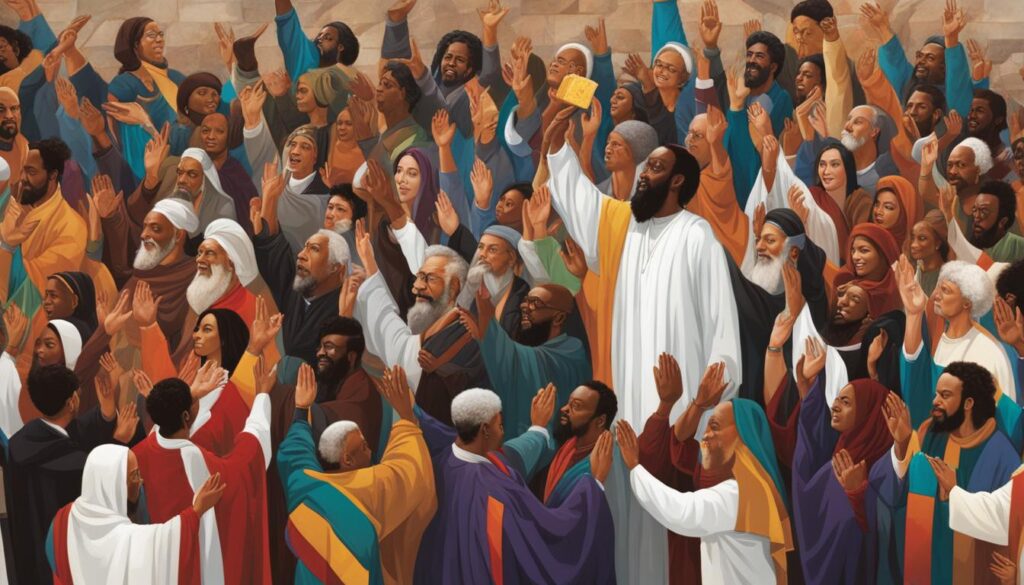
Protestants hold a range of beliefs that differentiate them from other Christian denominations. One core belief is the idea of salvation by faith alone. Protestants emphasize that individuals are saved through their personal faith in Jesus Christ, rather than relying on good deeds or rituals. This belief is rooted in the Protestant understanding of the Bible as the ultimate authority in matters of faith and salvation.
Another key aspect of Protestantism is the rejection of certain Catholic practices. Protestants do not pray to saints or venerate Mary, considering these practices to be inconsistent with biblical teachings. Instead, they focus on a direct relationship with God through prayer and personal devotion.
Protestant denominations vary in their beliefs about sacraments, church hierarchy, and worship styles. Some denominations, like Lutherans and Anglicans, practice sacraments such as baptism and communion. Others, like Baptists and Pentecostals, view these sacraments as symbolic rather than having any salvific power. Similarly, the structure of Protestant churches can range from more hierarchical denominations to those with a more congregational or independent structure.
The Key Beliefs of Protestants:
- Salvation by faith alone
- Authority of the Bible
- Rejection of prayers to saints and veneration of Mary
- Varying beliefs on sacraments, church hierarchy, and worship styles
Examples of Protestant Denominations:
- Lutherans
- Anglicans/Episcopalians
- Methodists
- Baptists
- Pentecostals
Beliefs and Practices of Puritans
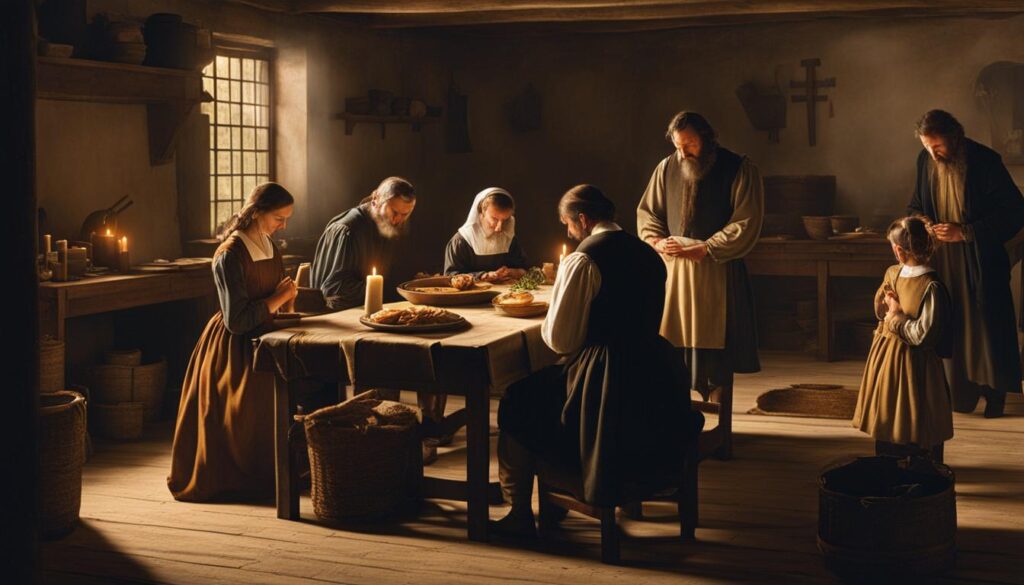
The Puritans, a distinctive group within Protestantism, held a set of beliefs and practices that set them apart from other Protestant denominations. Their devout nature and strict adherence to their principles shaped their way of life and influenced the development of early American society.
Puritan Beliefs
- Predestination: The Puritans believed in the concept of predestination, which held that God had already determined the salvation or damnation of individuals before their birth. This belief instilled in them a constant spiritual anxiety and a desire to search for signs of God’s favor or anger.
- The Bible as the Ultimate Authority: Similar to other Protestant groups, the Puritans emphasized the authority of the Bible as the sole guide for their faith and rejected certain Catholic traditions and practices.
- Moral Discipline: Puritans placed great importance on living a moral and disciplined life. They viewed worldly pleasures as sinful distractions and valued self-control, moderation, and hard work.
Puritan Practices
- Sabbath Observance: The Puritans dedicated Sundays to worship and rest. They strictly observed the Sabbath, attending lengthy church services and refraining from any secular activities.
- Plainness in Dress and Worship: The Puritans believed in simplicity and rejected extravagant displays. They wore plain clothing and advocated for modesty in appearance and behavior. Their worship services were characterized by simplicity, devoid of elaborate rituals or ceremonies.
- Tight-Knit Community Life: Puritan communities placed a strong emphasis on communal living and support. They valued collective responsibility and held each other accountable through rigorous church discipline.
These beliefs and practices shaped the Puritans’ daily lives and influenced their interactions with others. Their commitment to a righteous and disciplined existence left a lasting impact on the development of early American society and the shaping of religious ideals.
Differences in Church Structure and Governance
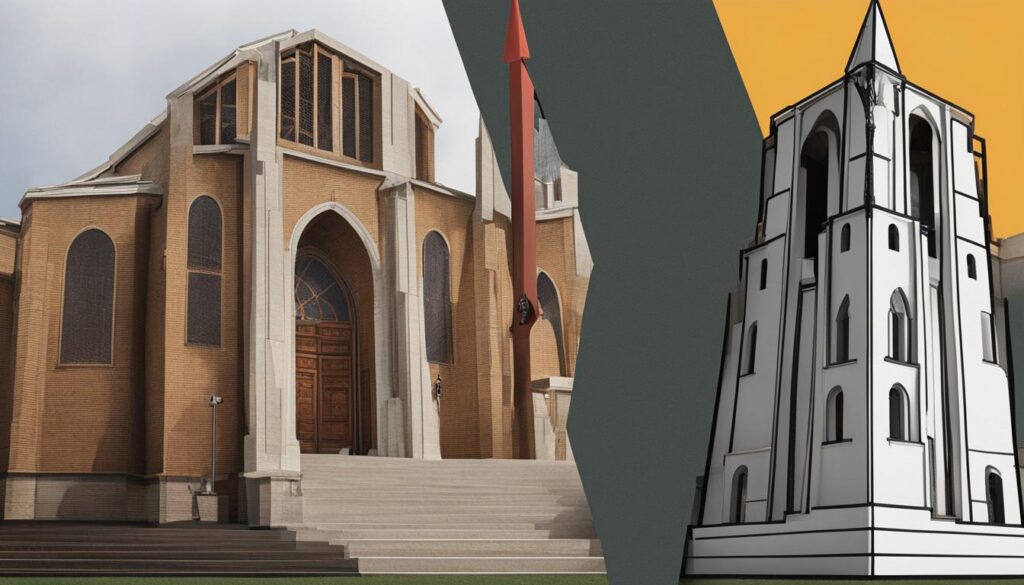
One key difference between Protestants and Puritans lies in their church structure and governance. Protestants, with their diverse denominations, generally have a more decentralized approach to church organization. Each denomination may have varying levels of hierarchy, with some adopting a more centralized structure and others emphasizing the autonomy of individual congregations. This diversity allows for different approaches to worship styles, sacraments, and church governance.
Puritans, on the other hand, favored a congregational church structure. This meant that each local congregation had a great deal of autonomy in decision-making, including the selection of ministers and the establishment of church rules and discipline. The congregational model allowed the Puritans to maintain strict control over religious practices and ensure conformity within their communities. The strong bonds formed within these congregational churches created a sense of solidarity and shared values among Puritans.
In Summary:
- Protestants have a more decentralized church structure with diverse denominations.
- Puritans favored a congregational church structure with local congregations having autonomy in decision-making.
- Protestants allow for varying worship styles, sacraments, and church governance.
- Puritans maintained strict control over religious practices and fostered strong community bonds.
These differences in church structure and governance highlight the distinct approaches that Protestants and Puritans took in organizing their religious communities. While Protestants embraced a more diverse and decentralized structure, Puritans sought to maintain strict control over religious practices and foster a strong sense of community within their congregations.
Legacy and Historical Impact
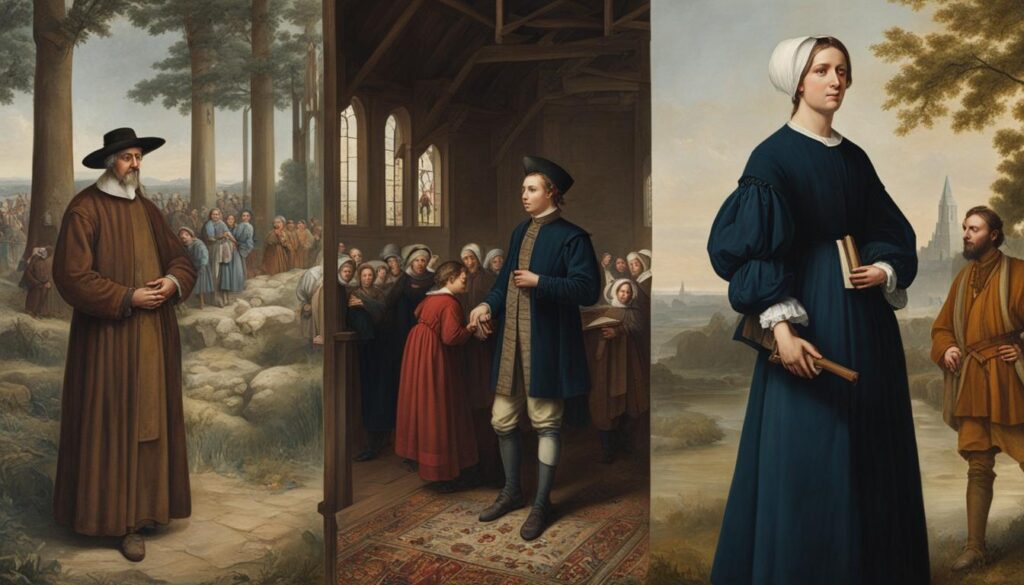
The similarities between Protestants and Puritans have had a profound impact on the history and culture of America. Both groups played significant roles in shaping the ideals of religious freedom and individual spiritual experience that are foundational to American society.
The Puritans, in particular, left a lasting legacy in New England. Their emphasis on personal piety and moral discipline laid the groundwork for the development of strong communities and a sense of collective responsibility. The Puritan work ethic, with its emphasis on hard work, frugality, and self-discipline, became an integral part of American culture and contributed to the nation’s economic success.
Protestants, on the other hand, contributed to the diversity of religious beliefs and practices in America. The various Protestant denominations that emerged allowed for a range of interpretations of Christianity, encouraging individual spiritual exploration and the development of different worship styles. This diversity continues to shape and enrich the religious landscape of the United States today.
The Influence of Protestantism and Puritanism
- Both groups fostered a strong sense of individualism and personal responsibility in matters of faith, which influenced the American ideals of individual freedom and self-reliance.
- Protestantism and Puritanism laid the groundwork for a separation of church and state in America, with the belief that religious matters should be a personal choice rather than enforced by the government.
- The Puritan emphasis on education and literacy contributed to the development of the American system of public education, ensuring that citizens could read and interpret the Bible for themselves.
- The religious freedom sought by both Protestants and Puritans paved the way for the establishment of religiously diverse colonies and eventually the First Amendment, which guarantees the freedom of religion in the United States.
The lasting impact of both Protestants and Puritans can be seen not only in the religious landscape of America but also in its social, political, and economic foundations. It is a testament to the power of religious beliefs and the influence they can have on a society.
Conclusion
Protestants and Puritans may share some similarities in their Protestant beliefs, but they are not the same thing. These two groups have distinct historical origins, practices, and interpretations of Christianity. Understanding these differences allows us to appreciate the complexities of religious history and the diverse paths that Christianity has taken over time.
Protestants emerged as a broader religious movement during the English Reformation, while Puritans were a specific group within Protestantism. Protestants believed in salvation by faith alone and emphasized the authority of the Bible. They rejected certain Catholic practices and had diverse denominations with varying beliefs.
Puritans, on the other hand, had stricter beliefs and practices compared to other Protestants. They believed in predestination and focused on the individual’s personal relationship with God. Puritans favored a congregational church structure with strict discipline and strong community bonds.
While both groups played significant roles in shaping American history and culture, they have left distinct legacies. The question of whether Protestants and Puritans are the same thing can be answered with a resounding no. By recognizing and understanding these differences, we gain a deeper appreciation for the rich tapestry of religious history.
FAQ
Are Protestants and Puritans the same thing?
No, Protestants and Puritans are two distinct groups with different beliefs and histories.
What is the difference between Protestants and Puritans?
Protestants were a broader religious movement that emerged during the English Reformation, while Puritans were a specific group within Protestantism. The Puritans sought a more thorough purification of the church and eventually formed separate churches, while the majority of Protestants remained within the Church of England.
What are the origins of Protestants and Puritans?
The Protestant movement originated during the reign of Elizabeth I and aimed to reform the Church of England. Some Protestants, known as Puritans, felt that the reforms were not enough and wanted a more thorough purification of the church. The Puritans eventually formed separate churches and sought religious freedom in Holland.
What are the beliefs and practices of Protestants?
Protestants believe in salvation by faith alone, emphasize the authority of the Bible, and reject certain Catholic practices. They have diverse denominations with varying beliefs on sacraments, church hierarchy, and worship styles.
What are the beliefs and practices of Puritans?
Puritans had stricter beliefs and practices compared to other Protestants. They believed in predestination and lived in constant spiritual anxiety, focusing on the individual’s personal relationship with God. They rejected many Catholic traditions and focused on purification and discipline.
What are the differences in church structure and governance between Protestants and Puritans?
Protestants generally have a more decentralized and diverse church structure, with denominations having varying levels of hierarchy. Puritans favored a congregational church structure, where each local congregation had autonomy in decision-making. Puritan churches were known for their strict discipline and strong community bonds.
What is the legacy and historical impact of Protestants and Puritans?
Both Protestants and Puritans played significant roles in shaping American history and culture. While the Puritans left a more lasting impact in New England, both groups contributed to the ideals of religious freedom and individual spiritual experience.

